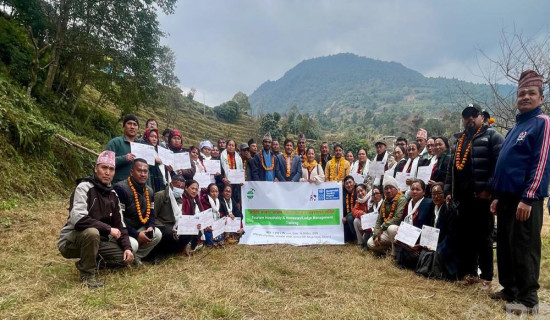- Sunday, 21 December 2025
Labour Exploitation Still Pervasive
We work for a minimum of 19 hours a day with no weekends and, on top of that, we don’t even get enough to eat.” This is a statement this writer has heard from many Nepali workers in restaurants in different European countries during my ventures to uncover modern day slavery and human trafficking. Recently while having afternoon snacks at a local restaurant in Kathmandu, I heard a loud voice from one of the cooks/waiters asking for food. He was telling another co-worker that he should be given at least three meals a day as he was working there round the clock. As soon as I heard this my ears got raised, as the Nepali cliché says.
I beckoned another worker who was listening to the angry burst of his colleague but was silently serving snacks to customers. I whispered to him: “Don’t you get to eat here?” He whispered back: “We can eat as much as we want, but we need to pay, but then where do we get the money to pay them”?” I took him outside the shop to hear his grievances and to get his number, but he said he could not afford a mobile phone and took my mobile number instead telling me that he would call me to talk about his hardships.
Workers exploited
The International Labour Day was just observed on May 1st all over the world. In Nepal, May 1st is a public holiday and was celebrated all over the world in different ways. Voices were raised by different labour unions on rights of workers and labourers. It is important here to reflect on how much voice has been raised on behalf of the Nepali migrant workers who are toiling all over the world and have become the main source of foreign remittance to Nepal. But in the process are exploited in their labour and wages. Reviewing the comments above, it is now time to reflect on how modern-day slavery is a reality even today all over the world. There are several Nepali women and men who have gone to work as migrant workers in developed and so-called well-off countries with human rights well established.
Unfortunately, many of these innocent and hard-working Nepali workers get exploited. Many a time they are exploited by fellow Nepalis. In 2019, I had exposed a story of human trafficking in Finland where Nepali restaurant owners exploited Nepali cooks and waiters whom they lured into wealthy European countries and exploited their labour. There were a lot of threats that came my way saying that the perpetrators would harm me but later it was taken up by local papers there and the government took action. The Nepali workers were protected by the Finnish Government who took action against the perpetrators. Similarly in 2021, I exposed another exploitation of Nepali workers by Nepali restaurant owners in Luxembourg. The government there has taken this up.
Most of the time migrant workers from countries like Nepal who go to work and earn for their families and countries are not highly educated. They also lack the network of people and organisations which can help them in case their human rights are abused. In fact, many of these workers are not even aware that the European countries where they go to work in have very strong labour laws and the governments have minimum wage which is very respectable, that they are entitled to. Unfortunately, investigations revealed that many Nepali restaurant workers call their friends and families mostly from their own villages. The work permits which countries like Finland and Luxembourg give are without charging fees.
However, the Nepali restaurant owners who call their fellow workers from Nepal either charge exorbitant amounts for these work permits or make a verbal contract that the workers coming in need to work freely for at least a year, then continue abusing them in labour and wages. All over Nepal, the youth, children and adults are seen working in different restaurants and shops since dawn to dusk. With no record of how much they are paid. It is not enough to just celebrate May Day. It is important to make sure that workers in all industries, including domestic helps, are respected for their work and are paid well. While observing International Labour Day on May 1, it is important to educate workers and labourers about their rights.
Labour movement
Those, who depart the country to work in other countries, need to be aware of their rights and are well connected to the network that can support them in case of abuse. Labour Day concept can be traced to the 19th century labour union movement in the United States. In 1889, the Marxist International Socialist Congress passed a resolution calling for a large international demonstration demanding that workers not be forced to work more than 8 hours per day. Since May 1, 1890 this day has been observed all over the world as International Labour Day.
It is important to make sure more work is done to educate workers and labourers about their rights. It is equally important for governments all over the world to make sure that such exploitation does not occur. Due to lack of awareness, education and resources, both human and materialistic, most workers and labourers, especially girls and women are very vulnerable to exploitation. With the impact of coronavirus pandemic their situation has been worsened. As this is still the week of Labour Day, let us all join hands in supporting the cause of this day by doing whatever we can.
(Namrata Sharma is a senior journalist and women rights advocate. namrata1964@yahoo.com Twitter handle: @NamrataSharmaP )











-(1)-original-thumb.jpg)




